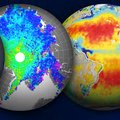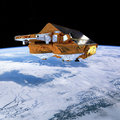News
04 October 2018
Using aircraft as weather stations

To fly safely, aircraft need accurate updates on wind and temperature. But together, aircraft can also act as a sensor network that provides information to make weather models and predictions better, researchers at TU Delft have found. This week they publish their findings in PLOS One.
26 September 2018
Two TU Delft proposals chosen to compete in ESA Earth Explorer mission

TU Delft has provided two of the three proposals that are competing for the tenth Earth Explorer mission by ESA, which is planned for 2027-2028. The Earth Explorer missions are aimed at Earth observation, one of the important aims of the European Space Agency (ESA).
25 September 2018
Opening of Ruisdael Observatory

The Ruisdael Observatory – named after the 17th-century painter Jacob van Ruisdael – combines a nationwide dense network of measuring points with high-resolution simulations and the necessary computing power in order to map out changes in local weather, air quality and climate. The official opening of the observatory is on 27 September, with a meeting in the grounds of the KNMI measuring station at Cabauw (Cabauw Experimental Site for Atmospheric Research, CESAR). In April this new top-class research facility was awarded a certificate from NWO’s National Roadmap for Large-Scale Scientific infrastructure.
04 July 2018
Extreme sea levels predicted to increase along global coastlines

Future global warming will lead to an increase in ‘extreme sea levels’, with consequent flood risks to coastal infrastructure and human populations. An international research team from Italy, Greece, the Netherlands (TU Delft / Deltares) and the UK published this new research in Nature Communications.
21 June 2018
Bedrock below West Antarctica rising surprisingly fast

Researchers have found that the bedrock below the West Antarctic Ice Sheet is rising much more rapidly than expected, revealing a very different Earth structure than previously believed. This discovery has important implications in understanding climate changes in Antarctica. The team of researchers, from ten universities including TU Delft, report on their findings in Science on June 22th.